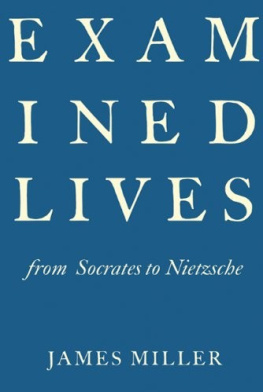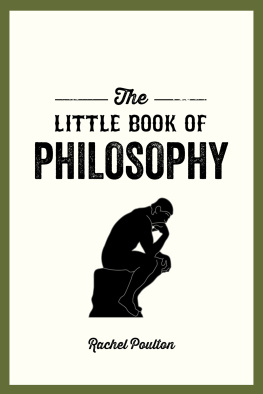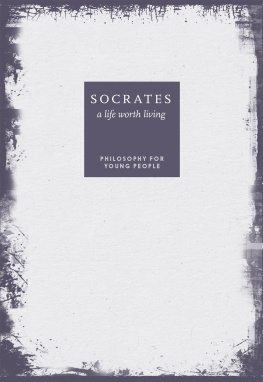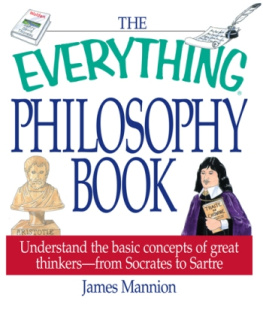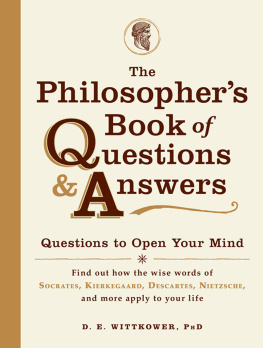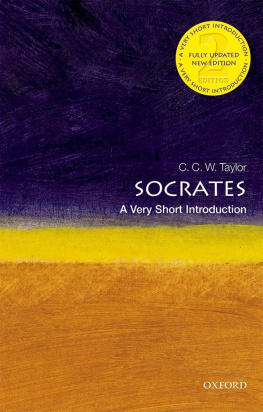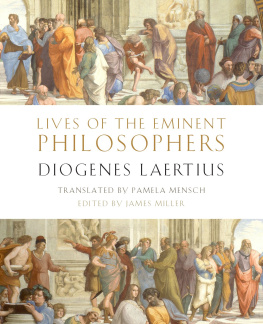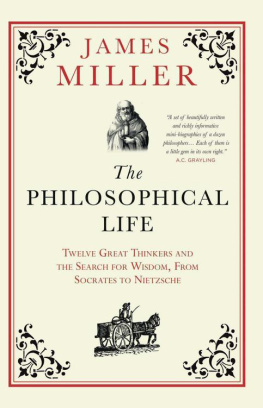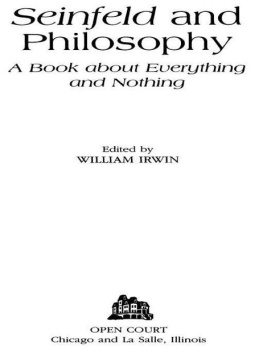
FOR RUTH
CONTENTS
INTRODUCTION
Of all those who start out on philosophynot those who take it up for the sake of getting educated when they are young and then drop it, but those who linger in it for a longer timemost become quite queer, not to say completely vicious; while the ones who seem perfectly decent become useless.
PLATO , Republic (487cd)
Once upon a time, philosophers were figures of wonder. They were sometimes objects of derision and the butt of jokes, but they were more often a source of shared inspiration, offering, through words and deeds, models of wisdom, patterns of conduct, and, for those who took them seriously, examples to be emulated. Stories about the great philosophers long played a formative role in the culture of the West. For Roman writers such as Cicero, Seneca, and Marcus Aurelius, one way to measure spiritual progress was to compare ones conduct with that of Socrates, whom they all considered a paragon of perfect virtue. Sixteen hundred years later, John Stuart Mill (18061873) similarly learned classical Greek at a tender age in order to read the Socratic Memorabilia of Xenophon (fourth century B.C. ) and selected Lives of the Eminent Philosophers , as retold by Diogenes Laertius, a Greek follower of Epicurus who is thought to have lived in the third century A.D.
Apart from the absurdly young age at which Mill was forced to devour it, there was nothing unusual about his reading list. Until quite recently, those able to read the Greek and Roman classics were routinely nourished, not just by Xenophon and Plato but also by the moral essays of Seneca and Plutarch, which were filled with edifying stories about the benefits and consolations of philosophy. An educated person was likely to know something about Socrates, but also about the Epicurean, the Stoic, and the Skepticphilosophical types still of interest to David Hume (17111776), who wrote about each one in his Essays, Moral and Political (17411742).
For Hume, as for Diogenes Laertius, each philosophical type was expressed not only in a doctrine but also in a way of lifea pattern of conduct exemplified in the biographical details recounted by Diogenes Laertius about such figures as Epicurus, the founder of Epicureanism; Zeno, traditionally regarded as the first Stoic; and Pyrrho, who inaugurated one branch of ancient Skepticism. Besides Hume and Mill, both Karl Marx (18181883) and Friedrich Nietzsche (18441900)to take two equally modern examplesalso studied The Lives of the Eminent Philosophers . Indeed, both Marx and Nietzsche, while still in their twenties, wrote scholarly treatises based, in part, on close study of just this work.
Today, by contrast, most highly educated people, even professional philosophers, know nothing about either Diogenes Laertius or the vast majority of the ancient philosophers whose lives he recounted. In many schools in many countries, especially the United States, the classical curriculum has been largely abandoned. Modern textbooks generally scant the lives of philosophers, reinforcing the contemporary perception that philosophy is best understood as a purely technical discipline, revolving around specialized issues in semantics and logic.
The typical modern philosopherthe Kant of the Critique of Pure Reason (1781), say, or the John Rawls of A Theory of Justice (1971)is largely identified with his books. It is generally assumed that philosophy refers to the study of the most general and abstract features of the world and the categories with which we think: mind, matter, reason, proof, truth etc., to quote the definition offered by the outstanding recent Oxford Dictionary of Philosophy . Moreover, in the modern university, where both Kant and Rawls practiced their calling, aspiring philosophers are routinely taught, among other things, that the truth of a proposition should be evaluated independently of anything we may know about the person holding that proposition. As the philosopher Seyla Benhabib puts it, Philosophical theories make claims to truth that transcend historical and social context. From inside the discipline, the details of personal lives seem quite irrelevant to understanding or evaluating a thinkers views.
Such a principled disregard of ad hominem evidence is a characteristically modern prejudice of professional philosophers. For most Greek and Roman thinkers from Plato to Augustine, theorizing was but one mode of living life philosophically. To Socrates and the countless classical philosophers who tried to follow in his footsteps, the primary point was not to ratify a certain set of propositions (even when the ability to define terms and analyze arguments was a constitutive component of a schools teaching), but rather to explore the kind of person, the sort of self that one could elaborate as a result of taking the quest for wisdom seriously. For Greek and Roman philosophers, philosophical discourse originates in a choice of life and an existential optionnot vice versa.
Or, as Socrates puts it in the pages of Xenophons Memorabilia , If I dont reveal my views in a formal account, I do so by my conduct. Dont you think that actions are more reliable evidence than words?
In ancient Greece and Rome, it was widely assumed that the life of a philosopher would exemplify in practice a specific code of conduct and form of life. As a result, biographical details were routinely cited in appraisals of a philosophys value. That Socrates faced death with dignity, for example, was widely regarded as an argument in favor of his declared views on the conduct of life.
But did Socrates really face death with dignity? How can we be confident that we know the truth about how Socrates actually behaved? Faced with such questions, the distrust of modern philosophers for ad hominem argument tends to be reinforced by a similarly modern skepticism about the kinds of stories traditionally told about philosophers.
Consider the largest extant compilation of philosophical biographies, the anthology of Diogenes Laertius. This work starts with Thales of Miletus (c. 624546 B.C. ): To him belongs the proverb Know thyself, Diogenes Laertius writes with typically nonchalant imprecision, which Antisthenes in his Successions of Philosophers attributes to Phemonoe, though admitting that it was appropriated by Chilon. He describes Thales as the first absentminded professor: It is said that once, when he was taken out of doors by an old woman in order that he might observe the stars, he fell into a ditch, and his cry for help drew from the old woman the retort, How can you expect to know all about the heavens, Thales, when you cannot even see what is just before your feet?
The work of Diogenes Laertius has long vexed modern scholars. His compilation represents an evidently indiscriminate collection of material from a wide array of sources. Despite its uneven quality, his collection of maxims, excerpts from poems, and extracts from theoretical treatises remains a primary source for what little we know today about the doctrines held by a great many ancient Greek philosophers, from Thales and Heraclitus (c. 540480 B.C. ) to Epicurus (341270 B.C. ). Diogenes anecdotes, on the other hand, have often been discounted, in part because he makes no effort to evaluate the quality of his sources, in part because his biographies are riddled with contradictions, and in part because some of the stories he recounts simply beggar belief.
The stories preserved by Diogenes Laertius occupy a twilight zone between truth and fiction. From the startin the Socratic dialogues of Platothe life of the philosopher was turned into a kind of myth and treated as a species of poetry, entering into the collective imagination as a mnemonic condensation, in an exemplary narrative, of what a considered way of life might mean in practice. Joining a school of philosophy in antiquity often involved an effort, in the company of others, to follow in the footsteps of a consecrated predecessor, hallowed in a set of consecrated tales. Long before Christians undertook an imitation of Christ, Socratics struggled to imitate Socrates; Cynics aimed to live as austerely as the first Cynic, Diogenes; and Epicureans tried to emulate the life led by their eponymous master, Epicurus.
Next page
